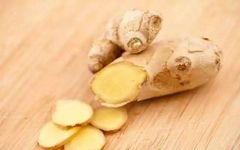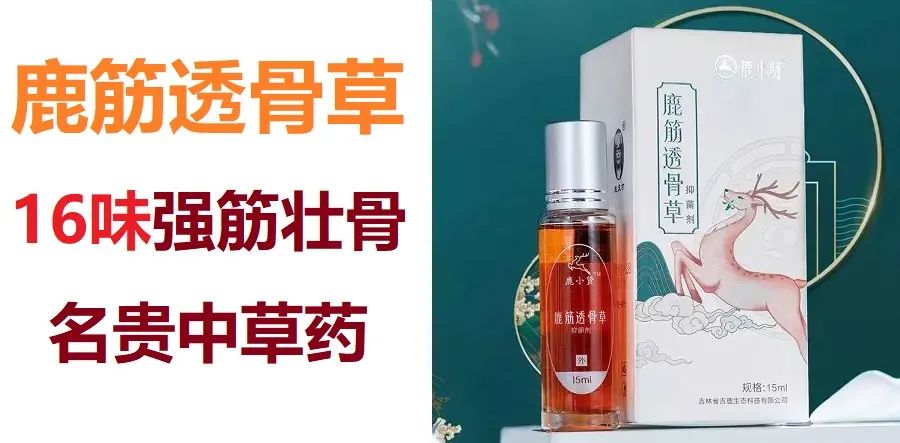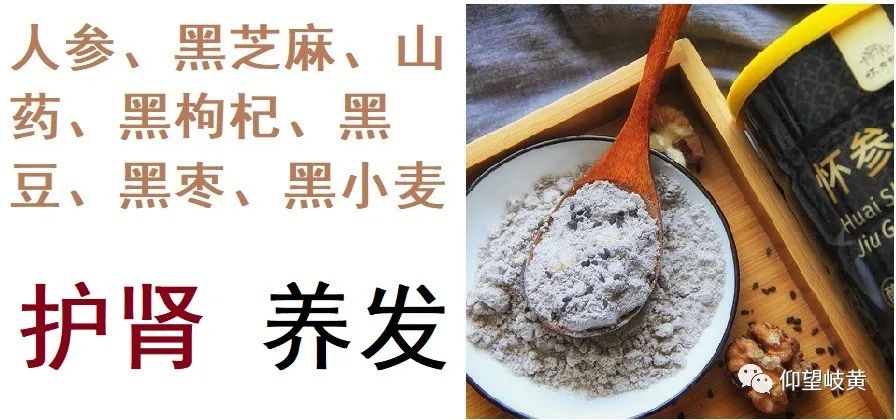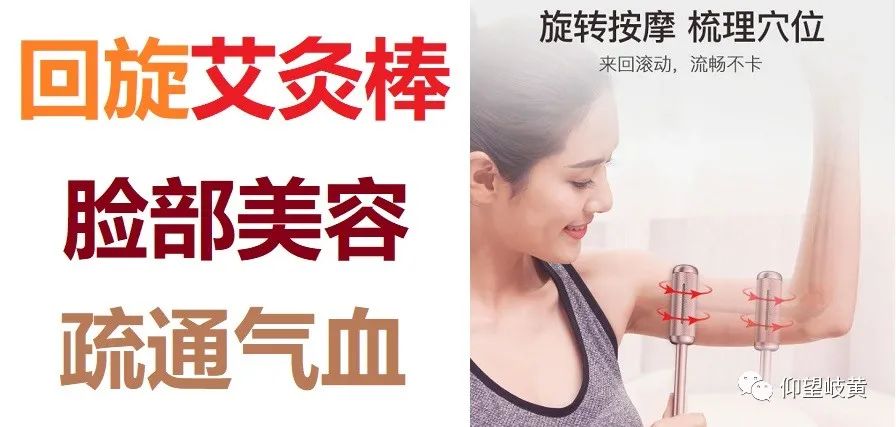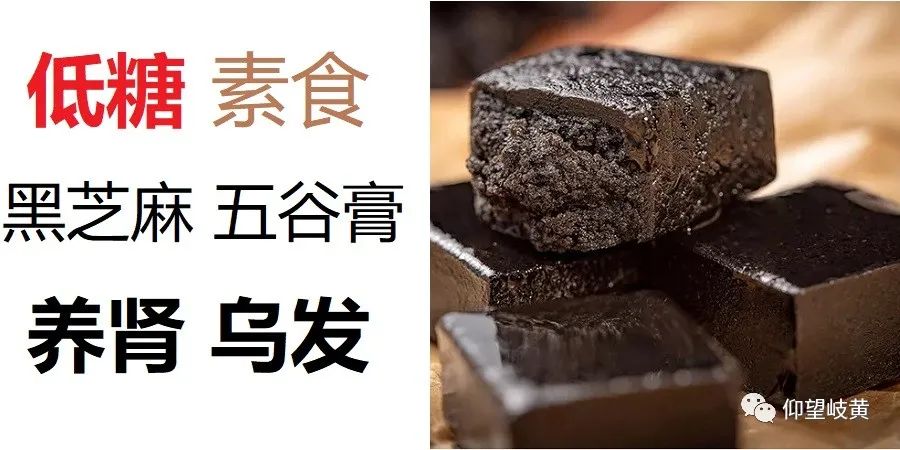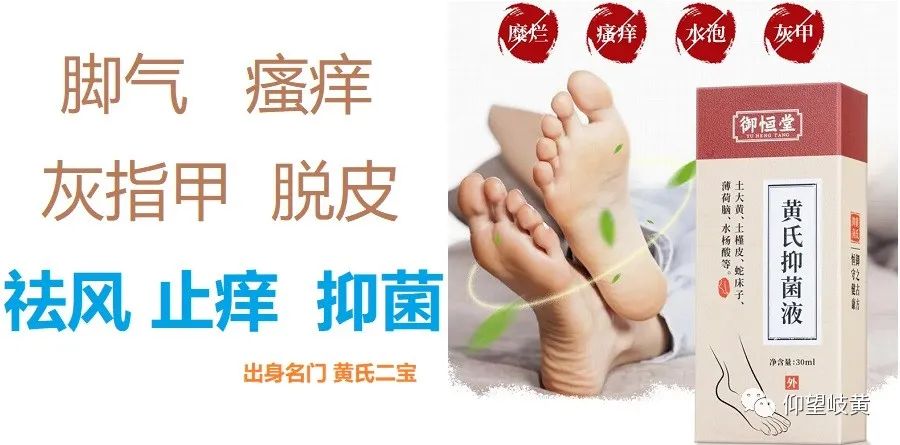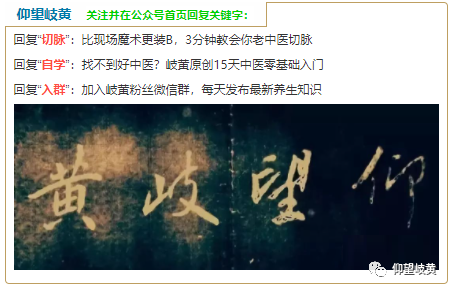
 Ginger — Releases the Exterior and Dispels Cold The renowned physician Sun Simiao stated: “As a physician, one must first understand the source of the illness, know what has been offended, and treat it with food. If food does not cure, then one may resort to medicine.” This means that for diseases, our first choice of treatment should be food; if food therapy fails, only then should we consider medication. So, how do we choose food? The first step is to clarify the body’s condition. Understand whether one has Yin deficiency with internal heat or Yang deficiency with internal cold, and then ascertain the Yin-Yang and cold-heat properties of foods. Finally, if there is heat, use cold foods; if there is cold, use warm foods to regulate the body’s Yin and Yang. In the previous section, we introduced ten Yin foods; in this section, we will introduce ten Yang foods. Among the ten Yang foods, ginger ranks first.Ginger, with a pungent flavor, warm nature, and fragrant aroma, is a typical Yang food.
Ginger — Releases the Exterior and Dispels Cold The renowned physician Sun Simiao stated: “As a physician, one must first understand the source of the illness, know what has been offended, and treat it with food. If food does not cure, then one may resort to medicine.” This means that for diseases, our first choice of treatment should be food; if food therapy fails, only then should we consider medication. So, how do we choose food? The first step is to clarify the body’s condition. Understand whether one has Yin deficiency with internal heat or Yang deficiency with internal cold, and then ascertain the Yin-Yang and cold-heat properties of foods. Finally, if there is heat, use cold foods; if there is cold, use warm foods to regulate the body’s Yin and Yang. In the previous section, we introduced ten Yin foods; in this section, we will introduce ten Yang foods. Among the ten Yang foods, ginger ranks first.Ginger, with a pungent flavor, warm nature, and fragrant aroma, is a typical Yang food.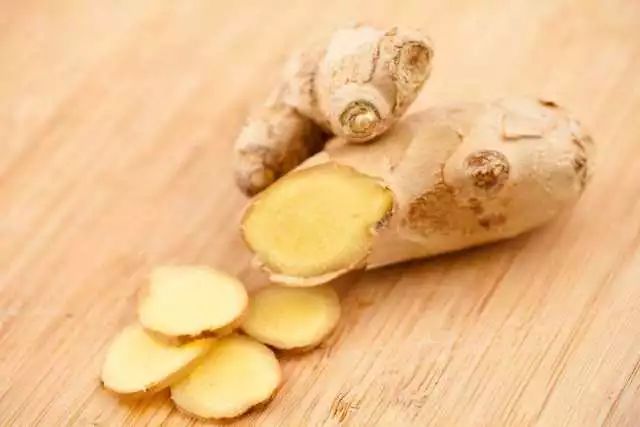 Remember, the greatest characteristic of Yin foods is their cold and cool nature, with a bitter taste and downward medicinal properties. When the Yang Qi in the body is excessive and internal heat is too great, we can use Yin foods to lower the Yang Qi, thus achieving Yin-Yang balance; whereas the greatest characteristic of Yang foods is their warm and hot nature, with a pungent flavor and upward medicinal properties. Their main function is to elevate the Yang Qi in the body. Therefore, when the Yin Qi in the body is excessive and internal cold is too great, we can use Yang foods to enhance Yang Qi and warm the channels to dispel cold. The greatest function of ginger is to promote Yang and disperse Qi. People often say: “Radish in the morning, ginger at night; no need for a doctor’s prescription.” This means that in the morning, when the Yang Qi of the body rises, consuming ginger, which is purely Yang, can help stimulate the Yang Qi, promote the circulation of Qi and blood, and keep one energized throughout the day. Moreover, due to ginger’s dispersing effect, when people are affected by wind-cold, they can boil ginger in water to dispel the cold from the surface of the body. At the same time, if a person is cold, causing heat expansion and cold contraction, the Qi in the body may become stagnant and immobile, leading to symptoms like vomiting and belching. In such cases, I often recommend ginger water, as ginger is pungent, light in nature, and has a strong dispersing effect, which can help release the stagnant Qi in the body, leading to recovery. Thus, Traditional Chinese Medicine often refers to ginger as the “sacred medicine for vomiting and belching.” It is important to note that individuals with Yin deficiency and excess fire, red tongue with yellow coating, or red eyes with internal heat should avoid ginger.
Remember, the greatest characteristic of Yin foods is their cold and cool nature, with a bitter taste and downward medicinal properties. When the Yang Qi in the body is excessive and internal heat is too great, we can use Yin foods to lower the Yang Qi, thus achieving Yin-Yang balance; whereas the greatest characteristic of Yang foods is their warm and hot nature, with a pungent flavor and upward medicinal properties. Their main function is to elevate the Yang Qi in the body. Therefore, when the Yin Qi in the body is excessive and internal cold is too great, we can use Yang foods to enhance Yang Qi and warm the channels to dispel cold. The greatest function of ginger is to promote Yang and disperse Qi. People often say: “Radish in the morning, ginger at night; no need for a doctor’s prescription.” This means that in the morning, when the Yang Qi of the body rises, consuming ginger, which is purely Yang, can help stimulate the Yang Qi, promote the circulation of Qi and blood, and keep one energized throughout the day. Moreover, due to ginger’s dispersing effect, when people are affected by wind-cold, they can boil ginger in water to dispel the cold from the surface of the body. At the same time, if a person is cold, causing heat expansion and cold contraction, the Qi in the body may become stagnant and immobile, leading to symptoms like vomiting and belching. In such cases, I often recommend ginger water, as ginger is pungent, light in nature, and has a strong dispersing effect, which can help release the stagnant Qi in the body, leading to recovery. Thus, Traditional Chinese Medicine often refers to ginger as the “sacred medicine for vomiting and belching.” It is important to note that individuals with Yin deficiency and excess fire, red tongue with yellow coating, or red eyes with internal heat should avoid ginger. Leek — Tonifies the Kidneys and Raises YangLeek, also known as “Yang-raising herb,” is undoubtedly a Yang food based on its name. It is warm in nature, pungent in flavor, and has the effect of tonifying the kidneys and raising Yang. Therefore, there is a saying in folk medicine: “Men do not part with leeks, and women do not part with lotus root.” Leek is Yang in nature, making it suitable for men to consume as it can enhance Yang; lotus root is Yin, thus suitable for women to consume as it can nourish Yin.
Leek — Tonifies the Kidneys and Raises YangLeek, also known as “Yang-raising herb,” is undoubtedly a Yang food based on its name. It is warm in nature, pungent in flavor, and has the effect of tonifying the kidneys and raising Yang. Therefore, there is a saying in folk medicine: “Men do not part with leeks, and women do not part with lotus root.” Leek is Yang in nature, making it suitable for men to consume as it can enhance Yang; lotus root is Yin, thus suitable for women to consume as it can nourish Yin.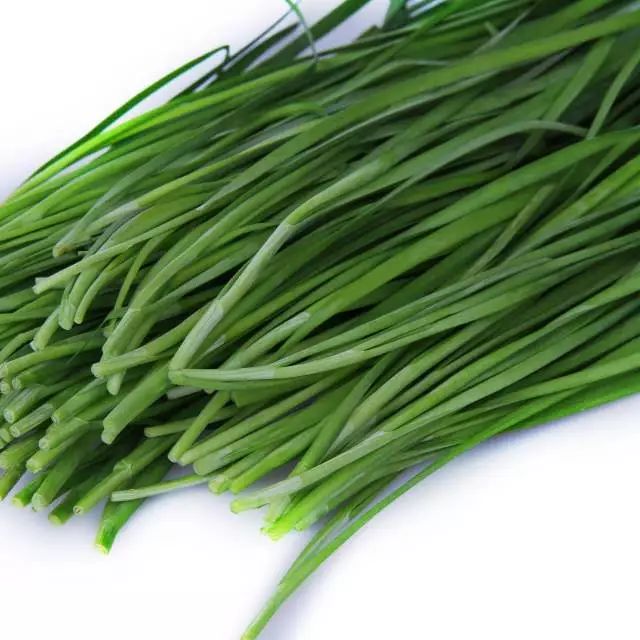 Leek is suitable for individuals with a cold constitution to consume in larger quantities. However, those with a weak stomach and internal heat or Yin deficiency with excess fire should avoid leeks. Leek is best consumed in spring. “Spring food is fragrant, summer food is stinky”; in spring, when the liver wood is active and Yang Qi is rising, consuming leeks is beneficial for tonifying the spleen and stomach Qi, which in turn nourishes the body’s overall Qi, helping to maintain Yin-Yang balance during the chilly spring weather.
Leek is suitable for individuals with a cold constitution to consume in larger quantities. However, those with a weak stomach and internal heat or Yin deficiency with excess fire should avoid leeks. Leek is best consumed in spring. “Spring food is fragrant, summer food is stinky”; in spring, when the liver wood is active and Yang Qi is rising, consuming leeks is beneficial for tonifying the spleen and stomach Qi, which in turn nourishes the body’s overall Qi, helping to maintain Yin-Yang balance during the chilly spring weather. Fennel — Warms the Lower AbdomenFennel can eliminate the fishy odor of meat and enhance the aroma of meat dishes, hence its name “fennel.” Note that there are two types of fennel — large fennel and small fennel. Large fennel refers to what we call star anise, while small fennel resembles grains of wheat.Small fennel, with a pungent flavor, warm nature, and properties that enter the liver, kidneys, spleen, and stomach meridians, can warm the liver and kidneys, warm the spleen and stomach, and regulate Qi and harmonize the center. Interestingly, it can also treat hernias, known as “small intestine Qi,” and there is a famous story associated with it.
Fennel — Warms the Lower AbdomenFennel can eliminate the fishy odor of meat and enhance the aroma of meat dishes, hence its name “fennel.” Note that there are two types of fennel — large fennel and small fennel. Large fennel refers to what we call star anise, while small fennel resembles grains of wheat.Small fennel, with a pungent flavor, warm nature, and properties that enter the liver, kidneys, spleen, and stomach meridians, can warm the liver and kidneys, warm the spleen and stomach, and regulate Qi and harmonize the center. Interestingly, it can also treat hernias, known as “small intestine Qi,” and there is a famous story associated with it.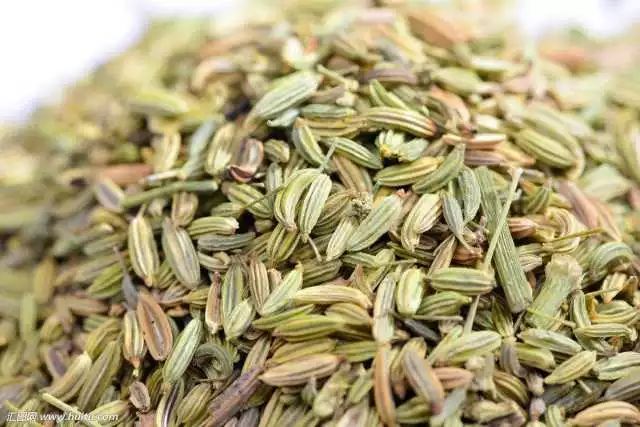 It is said that during the late Qing Dynasty, a wealthy Russian merchant named Mikhailov was touring West Lake when he was suddenly struck by a hernia, causing him to cry out in pain. In this emergency, the merchant’s accompanying doctor was at a loss. The boatman quickly recommended an old Chinese medicine practitioner. Upon arrival, the old doctor ground a small amount of small fennel into powder and had the patient take it with Shaoxing rice wine. About twenty minutes later, Mikhailov suddenly felt less pain, and after a while, the pain completely subsided. He thought the doctor had given him some rare medicine, only to find out it was small fennel, which he praised as miraculous. It turns out that small fennel can disperse cold and relieve pain, harmonize the stomach, and regulate Qi. Hernias, also known as small intestine Qi, are primarily caused by cold Qi accumulating between the small intestine, leading to lower abdominal pain and testicular swelling. Small fennel, being pungent and warm, has the function of dispelling cold Qi from the spleen, stomach, and small intestine, thus curing the wealthy merchant’s hernia. Because small fennel has the effect of warming the lower abdomen, it can also be used by women experiencing dysmenorrhea caused by cold. Small fennel is generally used for cold syndromes; however, if one has excess heat in the stomach, kidneys, or small intestine, using small fennel may worsen the symptoms. Therefore, individuals with heat toxins in their bodies should avoid small fennel.
It is said that during the late Qing Dynasty, a wealthy Russian merchant named Mikhailov was touring West Lake when he was suddenly struck by a hernia, causing him to cry out in pain. In this emergency, the merchant’s accompanying doctor was at a loss. The boatman quickly recommended an old Chinese medicine practitioner. Upon arrival, the old doctor ground a small amount of small fennel into powder and had the patient take it with Shaoxing rice wine. About twenty minutes later, Mikhailov suddenly felt less pain, and after a while, the pain completely subsided. He thought the doctor had given him some rare medicine, only to find out it was small fennel, which he praised as miraculous. It turns out that small fennel can disperse cold and relieve pain, harmonize the stomach, and regulate Qi. Hernias, also known as small intestine Qi, are primarily caused by cold Qi accumulating between the small intestine, leading to lower abdominal pain and testicular swelling. Small fennel, being pungent and warm, has the function of dispelling cold Qi from the spleen, stomach, and small intestine, thus curing the wealthy merchant’s hernia. Because small fennel has the effect of warming the lower abdomen, it can also be used by women experiencing dysmenorrhea caused by cold. Small fennel is generally used for cold syndromes; however, if one has excess heat in the stomach, kidneys, or small intestine, using small fennel may worsen the symptoms. Therefore, individuals with heat toxins in their bodies should avoid small fennel. Chuan Jiao (Sichuan Pepper) — Dispels Cold and Moisture Speaking of Chuan Jiao, people from the north may be puzzled: what is Chuan Jiao? They may not have heard of it. In fact, its common name is Sichuan pepper. The pepper produced in Qin is called Qin Jiao, while that produced in Shu is called Chuan Jiao.Chuan Jiao, with a pungent flavor, hot nature, and toxicity (referring to the raw state of Sichuan pepper), “Chuan Jiao can kill those who close their mouths.”Chuan Jiao is very hot and purely Yang, entering the spleen, stomach, lung, and kidney meridians, capable of warming the spleen and stomach, tonifying the Mingmen (Gate of Life), dispersing Yin cold, expelling roundworms, alleviating pain, and drying dampness, with numerous effects.
Chuan Jiao (Sichuan Pepper) — Dispels Cold and Moisture Speaking of Chuan Jiao, people from the north may be puzzled: what is Chuan Jiao? They may not have heard of it. In fact, its common name is Sichuan pepper. The pepper produced in Qin is called Qin Jiao, while that produced in Shu is called Chuan Jiao.Chuan Jiao, with a pungent flavor, hot nature, and toxicity (referring to the raw state of Sichuan pepper), “Chuan Jiao can kill those who close their mouths.”Chuan Jiao is very hot and purely Yang, entering the spleen, stomach, lung, and kidney meridians, capable of warming the spleen and stomach, tonifying the Mingmen (Gate of Life), dispersing Yin cold, expelling roundworms, alleviating pain, and drying dampness, with numerous effects.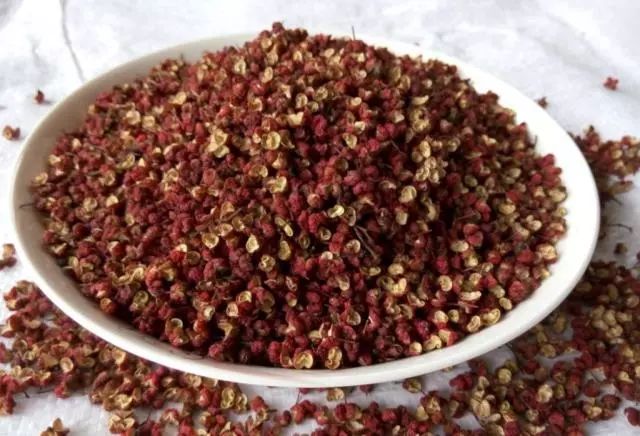 Using Chuan Jiao to soak feet in hot water can dry dampness and dispel cold. The famous TCM practitioner Shi Jinmo had a habit of soaking his feet in Sichuan pepper water every night. The reason is that Sichuan pepper water can expel dampness and cold, warm the spleen and stomach, and tonify the Mingmen. The spleen and stomach are the foundation of postnatal health, while the Mingmen is the foundation of prenatal health. Warming the prenatal foundation and tonifying the postnatal foundation is an important method for strengthening the body. Dampness, if it enters the body, is the hardest to expel and can lead to chronic illnesses. Therefore, Mr. Shi Jinmo understood these key points and developed this health-preserving method — soaking feet in Sichuan pepper water. I recommend everyone to persist in using this method, especially friends from the south, as it is essential. The south has abundant rainfall and heavy humidity. Speaking of dispelling dampness, we cannot forget about chili peppers. Southerners love to eat spicy food, not only for their taste preference but also for their lifestyle needs, as it helps to dry dampness and ward off cold, maintaining the harmony of Yin and Yang in the body. However, some southerners who move to the north continue to eat spicy food and later find it unsuitable. They may develop acne and redness on their faces, which they did not experience before. This is due to the change in environment; originally, eating spicy food could dispel dampness, but in the dry northern climate, it only increases internal heat and dryness, leading to the rise of stomach fire and consequently acne. Similarly, northerners should use less Sichuan pepper when cooking, as it can disrupt the balance of cold and heat in the body. Individuals with Yin deficiency and excess fire, as well as pregnant women, should avoid Sichuan pepper.
Using Chuan Jiao to soak feet in hot water can dry dampness and dispel cold. The famous TCM practitioner Shi Jinmo had a habit of soaking his feet in Sichuan pepper water every night. The reason is that Sichuan pepper water can expel dampness and cold, warm the spleen and stomach, and tonify the Mingmen. The spleen and stomach are the foundation of postnatal health, while the Mingmen is the foundation of prenatal health. Warming the prenatal foundation and tonifying the postnatal foundation is an important method for strengthening the body. Dampness, if it enters the body, is the hardest to expel and can lead to chronic illnesses. Therefore, Mr. Shi Jinmo understood these key points and developed this health-preserving method — soaking feet in Sichuan pepper water. I recommend everyone to persist in using this method, especially friends from the south, as it is essential. The south has abundant rainfall and heavy humidity. Speaking of dispelling dampness, we cannot forget about chili peppers. Southerners love to eat spicy food, not only for their taste preference but also for their lifestyle needs, as it helps to dry dampness and ward off cold, maintaining the harmony of Yin and Yang in the body. However, some southerners who move to the north continue to eat spicy food and later find it unsuitable. They may develop acne and redness on their faces, which they did not experience before. This is due to the change in environment; originally, eating spicy food could dispel dampness, but in the dry northern climate, it only increases internal heat and dryness, leading to the rise of stomach fire and consequently acne. Similarly, northerners should use less Sichuan pepper when cooking, as it can disrupt the balance of cold and heat in the body. Individuals with Yin deficiency and excess fire, as well as pregnant women, should avoid Sichuan pepper. Pepper — Warms the Middle and Dispels ColdPepper is a pungent and hot Yang substance. If one has a cold body, consuming it can dispel cold; however, if one has a hot body or is prone to heat illnesses, consuming it can exacerbate the condition. Li Shizhen wrote in the “Compendium of Materia Medica” that he had a particular fondness for pepper since childhood, to the extent that he developed eye problems every year. At that time, he did not suspect it was due to pepper, but later realized it and gradually gave up this habit, leading to the resolution of his eye issues.
Pepper — Warms the Middle and Dispels ColdPepper is a pungent and hot Yang substance. If one has a cold body, consuming it can dispel cold; however, if one has a hot body or is prone to heat illnesses, consuming it can exacerbate the condition. Li Shizhen wrote in the “Compendium of Materia Medica” that he had a particular fondness for pepper since childhood, to the extent that he developed eye problems every year. At that time, he did not suspect it was due to pepper, but later realized it and gradually gave up this habit, leading to the resolution of his eye issues.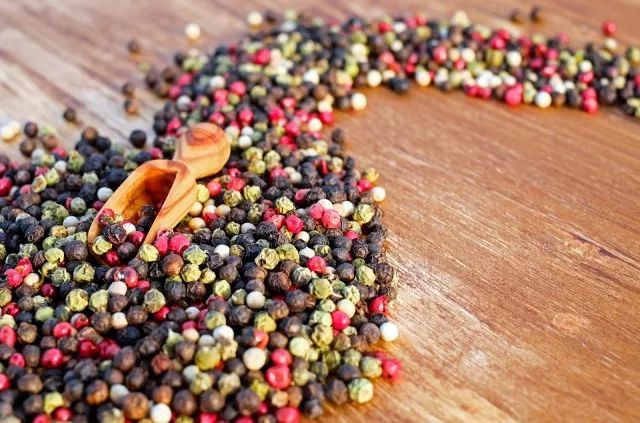 Why does pepper have these characteristics? It is because it can stimulate the generation of Yang Qi in the body. Pungent flavors disperse Qi, and hot nature promotes fire, so anyone with a sore throat, toothache, or eye disease should avoid pepper. When taking medicine, one must match the symptoms; the same goes for food. Pepper is not suitable for those with internal heat, but it is the best remedy for those with a cold body. Pepper can warm the middle, dispel cold, and strengthen kidney Qi. If one has stomach cold, diarrhea, or is prone to cold, they can consume some pepper. Additionally, pepper has an appetite-stimulating effect. I once wrote about Ming Dynasty physician Zhang Jingyue, who, while treating his son, knew that he needed warming and tonifying, but the child refused to take the medicine. In a moment of desperation, he thought of using pepper powder mixed in porridge, and the child indeed opened his appetite and was able to take the medicine, ultimately recovering. Today, we can use this method as well. If one has a poor appetite, especially due to cold, adding a little pepper when cooking can help stimulate the appetite and improve food intake.
Why does pepper have these characteristics? It is because it can stimulate the generation of Yang Qi in the body. Pungent flavors disperse Qi, and hot nature promotes fire, so anyone with a sore throat, toothache, or eye disease should avoid pepper. When taking medicine, one must match the symptoms; the same goes for food. Pepper is not suitable for those with internal heat, but it is the best remedy for those with a cold body. Pepper can warm the middle, dispel cold, and strengthen kidney Qi. If one has stomach cold, diarrhea, or is prone to cold, they can consume some pepper. Additionally, pepper has an appetite-stimulating effect. I once wrote about Ming Dynasty physician Zhang Jingyue, who, while treating his son, knew that he needed warming and tonifying, but the child refused to take the medicine. In a moment of desperation, he thought of using pepper powder mixed in porridge, and the child indeed opened his appetite and was able to take the medicine, ultimately recovering. Today, we can use this method as well. If one has a poor appetite, especially due to cold, adding a little pepper when cooking can help stimulate the appetite and improve food intake. Pumpkin — Warms and Tonifies Spleen QiPumpkin, bitter melon, carrot, tomato, garlic, and black fungus are known as the “six friends among vegetables.” Among them, bitter melon is Yin, tomato and black fungus are also Yin, while pumpkin and garlic are Yang, and carrot is neutral.Pumpkin is warm in nature, sweet in taste, and enters the spleen and stomach meridians, which can tonify and benefit Qi, making it very beneficial for those with spleen deficiency and weak Qi. For diabetic patients, pumpkin is an excellent vegetable as it can prevent rapid spikes and drops in blood sugar, stabilizing the condition, which aligns with TCM’s discussion on tonifying the spleen.
Pumpkin — Warms and Tonifies Spleen QiPumpkin, bitter melon, carrot, tomato, garlic, and black fungus are known as the “six friends among vegetables.” Among them, bitter melon is Yin, tomato and black fungus are also Yin, while pumpkin and garlic are Yang, and carrot is neutral.Pumpkin is warm in nature, sweet in taste, and enters the spleen and stomach meridians, which can tonify and benefit Qi, making it very beneficial for those with spleen deficiency and weak Qi. For diabetic patients, pumpkin is an excellent vegetable as it can prevent rapid spikes and drops in blood sugar, stabilizing the condition, which aligns with TCM’s discussion on tonifying the spleen.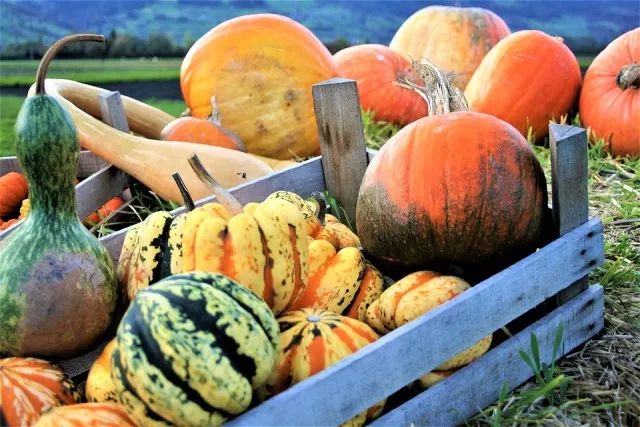 My mother once had slightly elevated blood sugar levels. At that time, we did not use medication for treatment but relied entirely on food therapy, consuming yam, pumpkin, and bitter melon regularly in our dishes. As a result, her blood sugar was very well controlled and has remained within the normal range for many years. We prepare pumpkin simply by cutting it into pieces and steaming it, resulting in a sweet and delicious dish. However, those with a hot constitution or stomach heat should consume pumpkin in moderation. Pumpkin tonifies Qi, so those with Qi stagnation and dampness should also avoid or limit pumpkin consumption. Overconsumption of pumpkin can lead to foot problems and jaundice. TCM emphasizes the principle of color complementing color; pumpkin is yellow, and excessive consumption can lead to jaundice. I have seen a case where a girl loved eating pumpkin and drank pumpkin porridge daily. After a while, she noticed her skin turned yellow, and her palms also became yellow. She thought she had liver disease, but after a hospital check, there were no issues. The doctor inquired about her diet and discovered that she had simply eaten too much pumpkin.
My mother once had slightly elevated blood sugar levels. At that time, we did not use medication for treatment but relied entirely on food therapy, consuming yam, pumpkin, and bitter melon regularly in our dishes. As a result, her blood sugar was very well controlled and has remained within the normal range for many years. We prepare pumpkin simply by cutting it into pieces and steaming it, resulting in a sweet and delicious dish. However, those with a hot constitution or stomach heat should consume pumpkin in moderation. Pumpkin tonifies Qi, so those with Qi stagnation and dampness should also avoid or limit pumpkin consumption. Overconsumption of pumpkin can lead to foot problems and jaundice. TCM emphasizes the principle of color complementing color; pumpkin is yellow, and excessive consumption can lead to jaundice. I have seen a case where a girl loved eating pumpkin and drank pumpkin porridge daily. After a while, she noticed her skin turned yellow, and her palms also became yellow. She thought she had liver disease, but after a hospital check, there were no issues. The doctor inquired about her diet and discovered that she had simply eaten too much pumpkin. Cilantro — Dispels Cold and Moves Qi When dining out, servers often ask if you eat cilantro. Some quickly say yes; others shake their heads, saying no. Those who love it do not need to know its benefits; they simply enjoy it; those who dislike it may find its benefits acceptable after learning about them.
Cilantro — Dispels Cold and Moves Qi When dining out, servers often ask if you eat cilantro. Some quickly say yes; others shake their heads, saying no. Those who love it do not need to know its benefits; they simply enjoy it; those who dislike it may find its benefits acceptable after learning about them.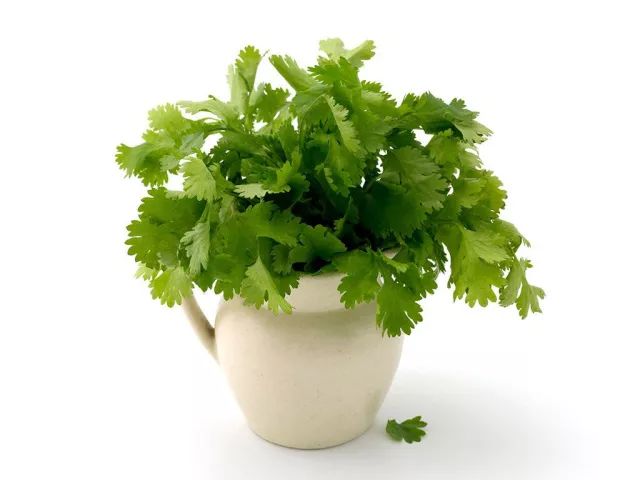 Cilantro, named for its aromatic properties, is commonly known as “Yuan Su” in the north and is a frequently used aromatic vegetable. Cilantro’s aroma is stimulating and can release the exterior and dispel cold, especially for those with external wind-cold, helping to induce sweating and dispel cold. The “Compendium of Materia Medica” states: Cilantro is pungent, warm, and aromatic, entering the heart and spleen, and can dispel unclean Qi and promote the proper Qi of the heart and spleen. However, because cilantro can move Qi, it is a releasing substance. Consuming it may easily lead to the recurrence of old illnesses. Additionally, it is important to note that individuals with body odor should avoid cilantro, as should those with bad breath, as it may exacerbate these issues. Even individuals with balanced constitutions should not consume it excessively, as overconsumption can affect vision and deplete Yin and Yang Qi.
Cilantro, named for its aromatic properties, is commonly known as “Yuan Su” in the north and is a frequently used aromatic vegetable. Cilantro’s aroma is stimulating and can release the exterior and dispel cold, especially for those with external wind-cold, helping to induce sweating and dispel cold. The “Compendium of Materia Medica” states: Cilantro is pungent, warm, and aromatic, entering the heart and spleen, and can dispel unclean Qi and promote the proper Qi of the heart and spleen. However, because cilantro can move Qi, it is a releasing substance. Consuming it may easily lead to the recurrence of old illnesses. Additionally, it is important to note that individuals with body odor should avoid cilantro, as should those with bad breath, as it may exacerbate these issues. Even individuals with balanced constitutions should not consume it excessively, as overconsumption can affect vision and deplete Yin and Yang Qi. Chestnut — Warms and Tonifies the Spleen and KidneysChestnuts are Yang foods and are very nourishing. Their tonifying effects can rival those of Angelica, Ginseng, and Astragalus, but overconsumption can lead to heat accumulation in the spleen and stomach.
Chestnut — Warms and Tonifies the Spleen and KidneysChestnuts are Yang foods and are very nourishing. Their tonifying effects can rival those of Angelica, Ginseng, and Astragalus, but overconsumption can lead to heat accumulation in the spleen and stomach.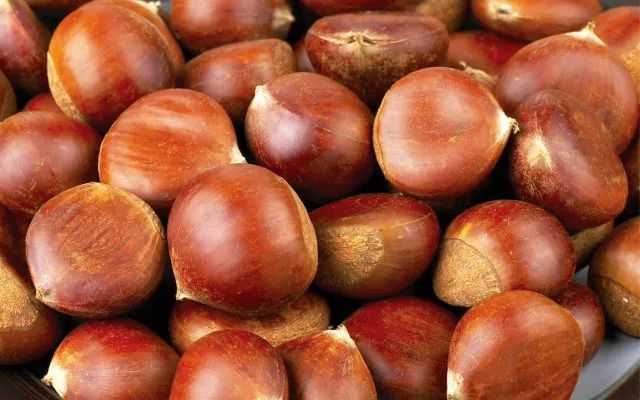 Chestnuts are warm in nature, sweet in taste, and enter the spleen, stomach, and kidney meridians. In folk medicine, they are known as “iron rod crops” and “woody grains.” For individuals with spleen and stomach deficiency and cold, they can tonify Qi and strengthen the spleen, and they also have kidney tonifying properties. In ancient times, chestnuts were referred to as the fruit of the kidneys. If elderly individuals experience lower back pain due to kidney deficiency, they can consume chestnuts for nourishment. However, it is important not to overconsume them, as chestnuts are “difficult to digest raw and can easily cause Qi stagnation when cooked,” indicating that moderation is key.
Chestnuts are warm in nature, sweet in taste, and enter the spleen, stomach, and kidney meridians. In folk medicine, they are known as “iron rod crops” and “woody grains.” For individuals with spleen and stomach deficiency and cold, they can tonify Qi and strengthen the spleen, and they also have kidney tonifying properties. In ancient times, chestnuts were referred to as the fruit of the kidneys. If elderly individuals experience lower back pain due to kidney deficiency, they can consume chestnuts for nourishment. However, it is important not to overconsume them, as chestnuts are “difficult to digest raw and can easily cause Qi stagnation when cooked,” indicating that moderation is key. Onion — Disperses Surface ColdGreen onions, garlic, and onions are often disliked by many due to their strong odor, causing others to avoid them after consumption. Additionally, cutting onions often brings tears. However, abroad, onions are regarded as the “queen of vegetables.” It is evident that onions are frequently used in Western cuisine. We can summarize that foods with pungent and stimulating flavors, such as chili peppers, Sichuan pepper, pepper, onions, green onions, and garlic, are mostly Yang foods that can stimulate the Yang Qi in the body. The “Huangdi Neijing” states: “Pungent disperses, sour collects, sweet relaxes, bitter firms, and salty softens.”
Onion — Disperses Surface ColdGreen onions, garlic, and onions are often disliked by many due to their strong odor, causing others to avoid them after consumption. Additionally, cutting onions often brings tears. However, abroad, onions are regarded as the “queen of vegetables.” It is evident that onions are frequently used in Western cuisine. We can summarize that foods with pungent and stimulating flavors, such as chili peppers, Sichuan pepper, pepper, onions, green onions, and garlic, are mostly Yang foods that can stimulate the Yang Qi in the body. The “Huangdi Neijing” states: “Pungent disperses, sour collects, sweet relaxes, bitter firms, and salty softens.”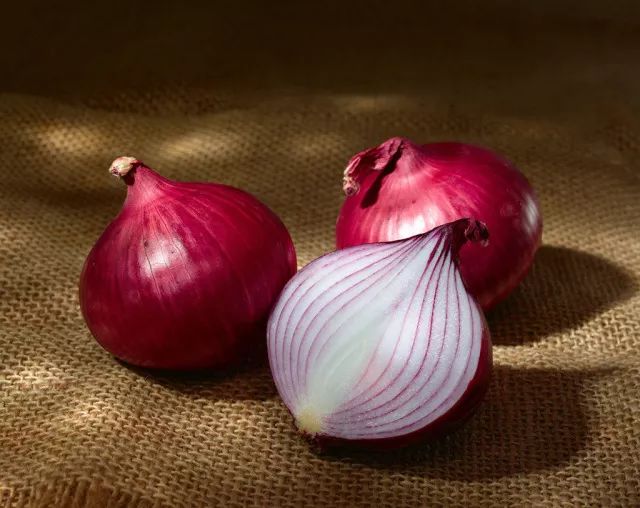 The pungent aroma has a dispersing effect, thus it can stimulate Yang Qi and induce sweating to release the exterior. If one has an external wind-cold, using these foods to dispel cold is very effective.Onion is sweet, slightly pungent, warm in nature, and enters the liver, spleen, kidney, and lung meridians, with the effects of warming the middle, promoting Yang, regulating Qi, and aiding digestion. However, its primary function is still to disperse wind-cold. If you have a cold and feel chilly but do not sweat, consuming more onions can help. Boiling onions in water to drink can also be effective; you will find that symptoms like lack of sweating and nasal congestion can quickly improve. However, individuals with internal heat should avoid onions. I know a friend who coughs whenever he eats onions, regardless of the amount, because he has internal heat. Eating onions only adds to the heat, leading to coughing.
The pungent aroma has a dispersing effect, thus it can stimulate Yang Qi and induce sweating to release the exterior. If one has an external wind-cold, using these foods to dispel cold is very effective.Onion is sweet, slightly pungent, warm in nature, and enters the liver, spleen, kidney, and lung meridians, with the effects of warming the middle, promoting Yang, regulating Qi, and aiding digestion. However, its primary function is still to disperse wind-cold. If you have a cold and feel chilly but do not sweat, consuming more onions can help. Boiling onions in water to drink can also be effective; you will find that symptoms like lack of sweating and nasal congestion can quickly improve. However, individuals with internal heat should avoid onions. I know a friend who coughs whenever he eats onions, regardless of the amount, because he has internal heat. Eating onions only adds to the heat, leading to coughing. Green Onion — Releases the Exterior and Promotes Yang Green onion has a pungent flavor and is slightly warm, with the effect of releasing the exterior and promoting Yang. There is a saying: “Onions irritate the eyes, garlic irritates the heart, and chili peppers irritate both ends.” The pungent flavor of onions can help the body expel surface cold, thus alleviating symptoms of cold and flu. When treating colds, we usually use the bulb part of the onion, which is commonly referred to as the white part. The white part of the onion enters the lung and stomach meridians. The “Compendium of Materia Medica” states that the white part of the onion “is effective for treating cold and heat, inducing sweating, and alleviating wind-cold symptoms.”
Green Onion — Releases the Exterior and Promotes Yang Green onion has a pungent flavor and is slightly warm, with the effect of releasing the exterior and promoting Yang. There is a saying: “Onions irritate the eyes, garlic irritates the heart, and chili peppers irritate both ends.” The pungent flavor of onions can help the body expel surface cold, thus alleviating symptoms of cold and flu. When treating colds, we usually use the bulb part of the onion, which is commonly referred to as the white part. The white part of the onion enters the lung and stomach meridians. The “Compendium of Materia Medica” states that the white part of the onion “is effective for treating cold and heat, inducing sweating, and alleviating wind-cold symptoms.”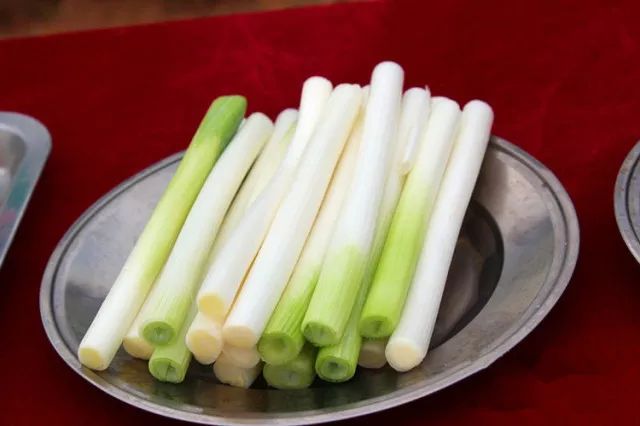 When experiencing a cold, boiling the white part of the onion in water and drinking it while hot can help induce sweating, alleviating symptoms like nasal congestion and chills. A folk remedy called “three roots soup,” made from onion roots, cabbage roots, and radish roots, is also used to treat mild colds, serving the same purpose of dispersing surface cold. In fact, TCM has been using green onions for a long time. Zhang Zhongjing was a master of using the white part of the onion. For example, in the “Treatise on Febrile Diseases,” he mentioned the white part of the onion several times, with the most famous being the Bai Tong Decoction, where the white part of the onion is a key ingredient. This formula treats the Shaoyin syndrome, where Yin is excessive and Yang is constrained, leading to a critical condition. Zhang Zhongjing used the white part of the onion to clear the obstruction, allowing Yang Qi to recover and harmonizing Yin and Yang. Understanding this principle helps us appreciate why Chinese cuisine often includes green onions; the flavor is one aspect, but it also serves to regulate Qi and harmonize Yin and Yang, showcasing the wisdom of our ancestors. The principles of health preservation are embedded in our daily lives, and we must not overlook them.
When experiencing a cold, boiling the white part of the onion in water and drinking it while hot can help induce sweating, alleviating symptoms like nasal congestion and chills. A folk remedy called “three roots soup,” made from onion roots, cabbage roots, and radish roots, is also used to treat mild colds, serving the same purpose of dispersing surface cold. In fact, TCM has been using green onions for a long time. Zhang Zhongjing was a master of using the white part of the onion. For example, in the “Treatise on Febrile Diseases,” he mentioned the white part of the onion several times, with the most famous being the Bai Tong Decoction, where the white part of the onion is a key ingredient. This formula treats the Shaoyin syndrome, where Yin is excessive and Yang is constrained, leading to a critical condition. Zhang Zhongjing used the white part of the onion to clear the obstruction, allowing Yang Qi to recover and harmonizing Yin and Yang. Understanding this principle helps us appreciate why Chinese cuisine often includes green onions; the flavor is one aspect, but it also serves to regulate Qi and harmonize Yin and Yang, showcasing the wisdom of our ancestors. The principles of health preservation are embedded in our daily lives, and we must not overlook them.

Recommended Health Products Click the image link for details:
|
|
|
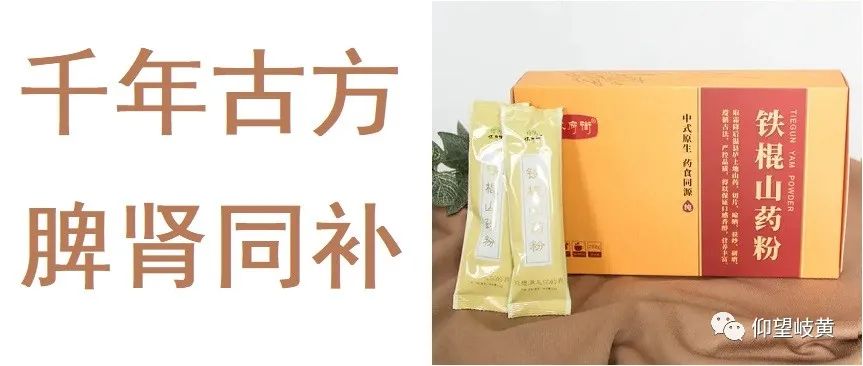 |
|
|
|
|

